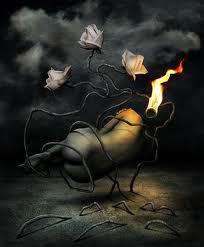
Our two grandsons and Mother with Grandmother ahead walking. 2016
We are forever being urged to keep walking. In times gone past we moved about using our legs which took us between different spaces. Inside our homes we still practice moving our legs till this day. Outside it is a different matter. I suppose, when the riding on top of a horse became fashionable, we managed to move a bit faster. In regions with snow and ice, skis and sledges were discovered, but, by and large we used our legs if we wanted to get somewhere…Some countries, the bicycle became a mode of transport which not only served to move people faster but it also kept legs and body very fit.
This is now all gone. Since the invention of wheels and engines, the car replaced our legs. Not only that, putting wings and engines together gave us flight, and we can now use airplanes to get from A to B. I am not sure at this stage what I am going to arrive at, or indeed what I am aiming for, except that the reason why streets in Australia always seem to be so empty of people might be because we have developed a way of living whereby the use of legs slowly became less important. And the car took over. Today, when we want to go from one place to another, the car clearly dominates over our legs. People think nothing of living somewhere whereby even to get a loaf of bread or the newspaper, they have to jump on wheel carriages and drive the metal box on wheels to get a loaf of bread or a bottle of milk.
I watched a good program on SBS last night how in the US and Australia, the market for vitamins and all sorts of untested medical supplementary paraphernalia is sold over the counter without having to proof their worth of the product nor the veracity of the printed label on the product. . Here it is:
https://www.sbs.com.au/programs/vitamania
Is this why there are so many chemists around? They are a major money making enterprise and one questions to what extend is their concern for our health? Some of the larger chemical shop consortiums are listed on the stock exchange. The huge number of chemist shops are in direct proportion of how far we live away from shops and each other. Even here in Bowral with a population of 12 000, it is spread out over an area the size of Amsterdam which has a population of about a million. In Amsterdam people can walk to get bread, here in Bowral most have to plan a major journey by car or bus to do the same. We are almost next to major hospitals and that has come in very handy. We were so lucky!
It is not always so easy to live near infrastructures such as shops, schools or trains, because most cities and towns have zonings that are either commercial or residentials, and when shops are zoned commercial they generally exclude residential dwellings. This means that people have to live away from shops or around the shops, and hence we revert to the car instead of our legs. We have cities and towns where very few actually live in those towns or cities. In the evenings they become empty ghost towns because people have gone home in their cars miles away.
Our way of building houses is very dependent on driving. So, by and large, people drive and give up walking, and that is why we are losing the use of legs and for many the only way to get legs moving and supple again is through joining a gym or get a rowing machine/weightlifing equipment stowed in the bedroom. Again to get to the gym, a car drive and not walking is the main mode of transport. It is no wonder so many now have to get knee and hip repairs done. They say; use it or lose it, don’t they? This might also be that there is a link between our lack of physical movements (walking) and our love of supplementary medicines and vitamins as promoted in chemist consortiums/emporiums. We prop up of what we feel we lack. Why have we developed a way of housing whereby we live so far from what we often need? And these needs are shops, entertainments, and streets full of people to talk with, and exchange some latest news.
I miss European cities.

 Most of the world knows about refugees. Italy alone took in 180 000 during 2016. More than three years ago anyone trying to reach Australia by boat would from then on be locked up. Manus and Nauru were the places agreeing to house refugees. Australia vowed never to let those into Australia.There are more than 1200 refugees still on those Islands. Most have been granted refugee status.
Most of the world knows about refugees. Italy alone took in 180 000 during 2016. More than three years ago anyone trying to reach Australia by boat would from then on be locked up. Manus and Nauru were the places agreeing to house refugees. Australia vowed never to let those into Australia.There are more than 1200 refugees still on those Islands. Most have been granted refugee status.




